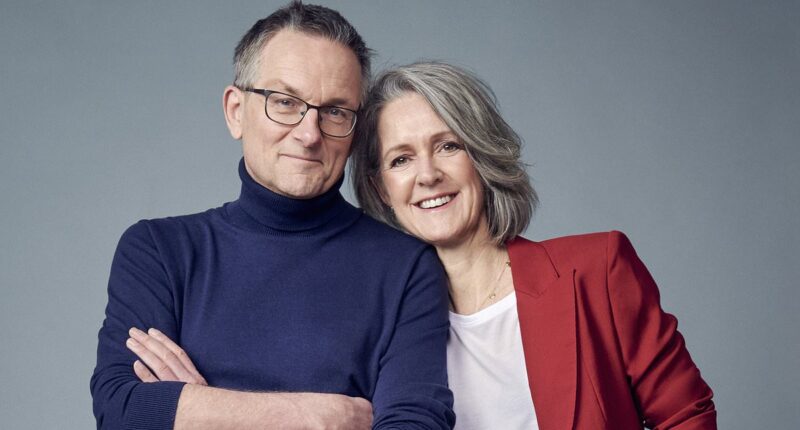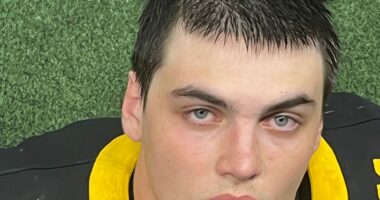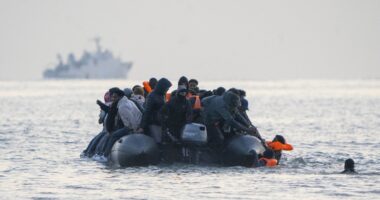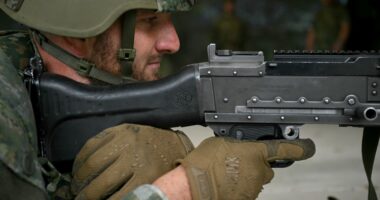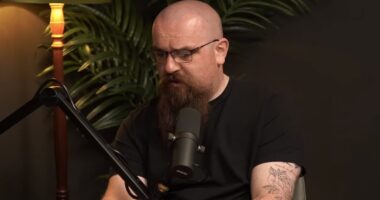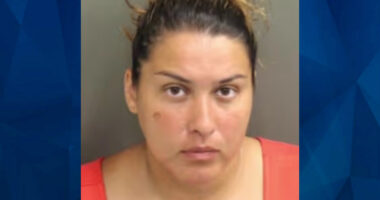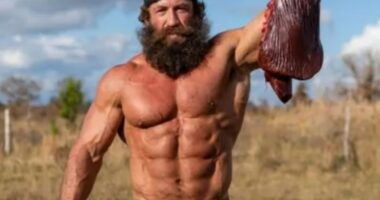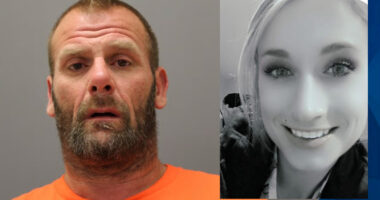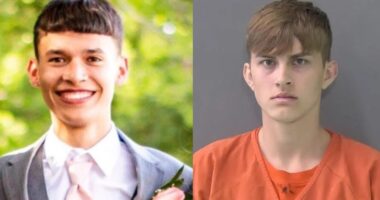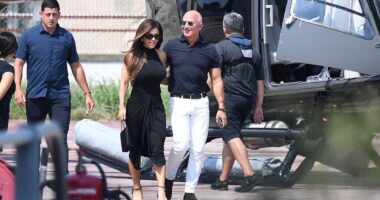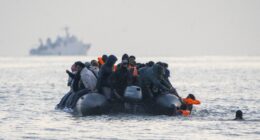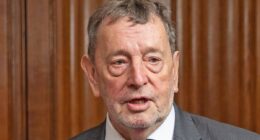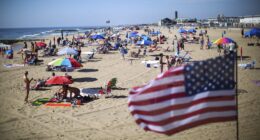There is a serenity about Dr Clare Bailey Mosley’s grief that startles me. A year after her adored husband Michael died while walking in searing heat on the rocky outcrop of a small Greek island – perhaps of heatstroke, perhaps of a heart attack; ‘What does it matter?’ she asks, simply – there is no rage, no recrimination, no litany of ‘what ifs?’
You might expect her to be tortured by the random cruelty of this sudden, tragic loss.
Instead, she chooses to focus on the positives, on the fearless adventurer her husband was.
‘Michael loved exploring. That was the joy of him,’ she says. ‘His death was in keeping with his life.
‘He was a maverick, a bit of a risk-taker. He pushed boundaries. I loved him for that; it made him so special. He was unorthodox and just so brilliant.
‘Others went to look at the place where he died. I just didn’t want to know too much about it. All I really wanted to know was that he was not suffering or in pain.
‘That is what mattered. And he was not distressed. I hold on to that, and the fact that it all happened so quickly, and that no one was to blame.
‘No one did the wrong thing. It’s no one’s fault. There is no sense of anger. It’s just an awful thing to have happened, as these things sometimes do.’

Clare Bailey and Dr Michael Mosley. She describes him as ‘a maverick, a bit of a risk-taker. He pushed boundaries. I loved him for that; it made him so special. He was unorthodox and just so brilliant’

Clare and Michael on their wedding day in 1987
Poignantly, she still occasionally speaks of him in the present tense. She says: ‘I’d always assumed Michael might come off his bike. The number of times I’ve had to pick him up after he’d run into a bus or crashed into something while he adjusted his brakes.
‘I sometimes don’t know what goes through his head.
‘But once he’d started on his walk he would never give up or turn back. He’d just keep going. That was how he was. Adventurous.’
Dr Michael Mosley, 67, universally loved and uniquely gifted, was an author, broadcaster, TV presenter and Daily Mail columnist – which is why Clare, 63, has chosen to give her first interview since his death to this paper, for which he first wrote in 2011, garnering millions of devoted readers.
His talent and enduring legacy was to distil the essence of complex scientific concepts into simple, relatable advice – notably in the BBC radio series Just One Thing – which the nation took to its heart.
Perhaps his greatest discovery was learning that it is possible to prevent and reverse type 2 diabetes (including his own) with diet. This revelation alone, enshrined in his best-selling book The 8-Week Blood Sugar Diet, may have saved millions of lives.
He famously experimented on himself, ingesting a tapeworm, making black pudding out of his own blood and putting a needle through his hand on air – all in the name of scientific research.
While he was the creative force in the marriage – a giddying vortex of imaginative and original ideas – Clare was the quiet facilitator, finding practical ways to implement his plans.

Michael’s body was found near Agia Marina in Symi, Greece, four days after going missing on June 5 last year

Volunteers joined an intensive search for Michael
A retired GP, who co-authored many of Michael’s books, devising all the recipes, she is fine-boned and slender with delicately pretty features; her voice light and gentle, but steady.
Sitting at the kitchen table of their family home in Buckinghamshire, sunlight flooding through tall windows, she begins, tentatively yet with typically forensic attention to detail, to tell the story of their week-long trip to Symi, which began as a holiday but escalated into tragedy.
The couple had arrived by ferry late in the evening of June 4 last year to stay with great friends at their villa.
‘We’d only been there for half a day before it happened,’ she recalls. ‘We took a boat round the promontory to a little beach, St Nicholas, which had a small café. We were just going to veg out in the afternoon.
‘So we settled in, with a glorious turquoise sea surrounding us. We were all relaxed, reading our books, having the odd little dip, then a coffee in the taverna.
‘Typically, Michael got bored. He wasn’t enjoying his book and he doesn’t really like lying on beaches…’ there’s that present tense again… ‘so he said, “I’m going exploring. I’m off for a walk”.
‘He agreed to meet us back at our friends’ villa. I gave him my litre bottle of water and in his rather eccentric way, he had an umbrella to shield him from the sun. It was 1.30pm and he was given instructions on where to walk.
‘He set off at a good pace, his rucksack on his back, up a steep hill. He hadn’t brought his phone because he didn’t want to risk it getting wet on the boat.’
Clare and her friends spent a leisurely afternoon on the beach before returning home. ‘And when we got there and found that Michael wasn’t back we were concerned. Had he walked directly, he’d have been there in under an hour.
‘Feeling things weren’t right, we went to the police station and reported him missing. The police said, “We can’t do anything about it until he’s been gone for 48 hours”.
‘I said, “What, in this heat?” It was 40 degrees, the hottest day for decades.
‘I had to push really hard, but finally they agreed to get a local search-and-rescue team out, then we went to the little hospital, but there was no sign of him there.’

Clare has chosen to focus on the positives and celebrate her late husband’s life
Shortly before dusk, when he still hadn’t returned, Clare, her concerns mounting, called their children Alex, 34, Jack, 33, Dan, 30, and Kate, 26 to alert them.
Unbeknown to her they made immediate plans to fly out to join her. Then she called the British consulate in Athens, and afterwards she and the friend she was staying with put an appeal out on the Symi social media page: ‘And it suddenly went “whoosh” and local people turned out in force to search.’
As daylight began to fade, Clare set out on her own quest to find Michael: ‘I spent a couple of hours walking along the coast and through trees and gorse calling his name. Every time I met someone I asked, “Have you seen him?”
‘Then it got dark. It became devastatingly obvious something had gone terribly wrong.
‘But it was reassuring to know that the emergency services were trawling backwards and forwards through the undergrowth by then, covering everywhere.
‘They searched all through the night and it was really quite extraordinary; the focus and commitment of all these forces.’
That first night, Clare recalls: ‘I just curled up in bed and cried.’
She was up before dawn the next day, calling Michael’s agent in London and returning to the hospital, where there was still no sign of him.
Then she and a friend combed the island’s wasteland: ‘We feared he’d collapsed and fallen, tripped over something in this strange territory.
‘It was an area smugglers had colonised; confusing, with derelict houses whose water systems ran under them to keep them cool. We were worried that he’d stumbled into one of these huge vats of water.
‘He’d been wearing a blue shirt and when we glimpsed blue refuse bags in the distance, the same colour, we thought it was him.
‘We zig-zagged from the beach, up to the ancient fortress, totally focused, forensic, systematic. I was in doctor mode.’
But, despite their rigour, they found nothing.
Later that evening, the Mosley children arrived: ‘Extra plates were laid at the table; our friends were just so calm and supportive. They held us all together.
‘There was this extraordinarily close, intimate sharing of agony, of tears and laughter – because they are closely aligned – and it was as if we were in a capsule, surrounded by a kind of magical cordon that gave us a sense of safety in impossible circumstances.’
Disparate memories surface. She recalls that she couldn’t eat because, ‘everything tasted dry and I couldn’t swallow’. But she knew she had to eat to function, so smothered everything in mayonnaise, which helped.
She remembers, too, a tremendous surge of energy that propelled her through the next day’s search.
Wild stories also started to circulate about what could have happened to Michael.
‘There was a suggestion that he could have been abducted. It was weirdly ironic because we were saying, “We hope he’s been held hostage somewhere”, because bizarrely that offered us a thread of hope when our hopes were fading.’
There was a sighting, too, on CCTV, of a man who looked like Michael: ‘He had similar clothes and cap, and for a moment there was this sudden surge of hope. It was a false alarm.’
The combined efforts of scores of volunteers, search-and-rescue teams, coastguard, police, firefighters, divers, drones and sniffer dogs – only able to work for short spells thanks to the heat – all buoyed her.
‘There was something incredibly comforting, therapeutic even, about the fact that so many people were searching for Michael.’
Their children had, by then, joined the search parties: ‘It was a challenge because it was so hot. One of them suffered from heat stroke and had to go back to the house.’ And resolutely, she refused to imagine the worst: ‘I was naively optimistic. I think I was in denial.
‘I remember sitting on the balcony watching the helicopters go round and round and still thinking, “One of them will find him”.’
The sleepless nights stretched out interminably. Then, four days after he had gone missing, Michael’s body was finally found.
The island’s mayor, out in a boat on the Sunday, which was June 9, with a British TV crew, spotted a dark shape lying near the fence, within a few hundred yards of the beach bar at Agia Marina. Their fears were confirmed: It was Michael’s body.
It later emerged he had died only a couple of hours after leaving St Nicholas beach. Having missed his turn-off he had stumbled and fallen as he descended the rock-strewn mountain path.
He was so close to safety and only 100 yards from a spot his children had already searched.
Back at her friends’ villa, Clare took a call from a member of consulate staff imparting the news they had dreaded. She recalls: ‘She said, “They’ve found him”.’
She cries now, briefly, collects herself; continues: ‘And that was it. We put our arms round each other and there were hugs and tears. And after that, we all slumped. I could make no sense of anything.’
Clare does not allow herself to regret the fact he was so close to help, which might have saved his life, instead preferring to be positive: ‘He was in a very beautiful place and he so very nearly made it. Actually, I take comfort from that.’
She expresses immense pride in her children and recalls how her ‘practical’ daughter Kate, who has a law degree, took charge of the repatriation of Michael’s body, the retrieval of his possessions, the essential paperwork.
‘And I just sat there with my eyes shut while she pushed forward and got everything sorted.’
She looks back on it all now and snapshots, both of sadness and solace, stay with her.
She remembers the respectfulness of the media and the sheer volume of coverage: ‘There was one photo of Michael on a stretcher with an arm sticking out and, having seen it, I could not un-see it. It was so distressing, so poignant.
‘And there was an amazing one, too, of the kids walking in a row, all dirty and dishevelled, looking exhausted after a day’s search, and they looked so purposeful and wholesome. That lifted me.’
Back in the UK, Clare remembers sitting with her husband in the funeral home: ‘And that was very comforting. But I was shocked to see his name on the coffin. The finality of it. I had not fully computed it.’
Today there is a pervasive sense that he is still around us at the home in Beaconsfield they shared for 25 years; in photos, books, broadcasts; in Clare’s memories: ‘There are all sorts of things I will go back to, listen to and read.’
She had almost resolved to sell this handsome Arts and Crafts house where they raised their family; where she now lives with a lodger who has replaced the recently-departed Ukrainian family to whom – with typical kindness – the Mosleys gave refuge.
But it was too much, too soon. So she is staying.
She does not, in the manner of so many widows, talk to him. But she does feel a ‘remarkable, comforting connection’ when she looks at her favourite photo of him, smiling in a blue jumper.
I ask her what she misses most about him. ‘It’s the quiet, comfortable times when we would just sit together and chat nonsense,’ she says.
She cries still; of course she does, but they are not great, shuddering outpourings of grief. ‘I shed a few tears and move on. I deal with it with a strange mix of denial, acceptance and distraction.
‘I’m getting used to being on my own and the children have been amazing. They’ll pop up and say, “I’m coming to stay for a week”.’
She also sleepwalks. It is an inveterate habit that has happened more – once or twice a week now – since Michael’s death: ‘One night I collected his papers and books, and woke up to find them surrounding me in bed.’
She laughs and I remember that when I interviewed them together in 2017 there was a prevailing mood of humour.
When they met, at University College London Medical School in 1980 (they married seven years later) they used to belong to a society that performed Footlights-style medical skits.
‘Save all your kidneys for me,’ warbled Michael, remembering a spoof of the 1976 Brotherhood of Man’s Eurovision-winning song.
Clare’s statement after his death referred to her ‘wonderful, funny, kind and brilliant husband’, and she focused, not on loss, but on the wonderful life they’d had together.
‘Yes,’ she agrees now. ‘Michael always said I was the positive one. He was more anxious. We complemented each other perfectly.’ Loss has whittled her. She looks even tinier than she did when I first met her eight years ago, and admits she often ‘forgets’ to eat.
I ask what Clare dreads most and she says: ‘That he will just become a sepia photograph, a story,’ and I tell her there is no chance of that.
Indeed, a clinical research fellowship in his memory is being set up to improve the nation’s metabolic health.
His family, in partnership with King’s College London and the Chronic Disease Research Foundation, have pledged to continue research that embodies Michael’s mission to help people live longer, healthier and happier lives.
‘He had such an extraordinary life,’ she agrees. ‘And such an incredible temperament. He was shy, but he pushed through it, and he had an energy and kindness that drew people in.’
She recalls his incredible ability to focus amid the mayhem of family life. ‘He’d be calmly writing a TV script with chaos all around him’ she smiles.
The huge, heartfelt mourning that greeted his death was overwhelming. People felt they knew him; their gratitude to him was reflected in the thousands of messages of condolence Clare received and took such comfort from.
‘He was passionate about improving people’s health,’ says Clare. ‘He had a lot to say and I want to keep that legacy going.’
I ask her which, among the succession of grief-filled days that have punctuated his passing, was the worst?
‘The very first one,’ she says, emphatic. ‘It was so overwhelming when he went missing, as if every-thing was dropping off a cliff edge.’
She recalls their last goodbye: ‘It was just an ordinary exchange of words as he went off for his walk. Very banal. I don’t think there was even a kiss.’ She gives a small, reflective smile.
In December, returning an open verdict, senior Buckinghamshire coroner Crispin Butler said his death was ‘indeterminate’ and ‘unascertainable’, adding that it ‘was most likely attributable to heatstroke (accidental) or non-identified pathological cause’.
Clare feels no compulsion to know more. ‘It is a tragic story, played out in the public eye, but it is a simple one. It could have been much more complicated. We might never have found Michael and we would have had no closure.
‘But I had the children and wonderful friends with me, and most of all I feel very lucky to have had my life with Michael.
‘We loved each other very much and had the most amazing time together.’
To donate to the Michael Mosley Fellowship, or for information, go to: justgiving.com/campaign/michaelmosleyfund
